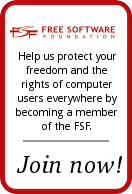You are here
Don't forget that the end-user of your software might be restricted by patents or legislation
Many Free Software developers wish to enhance their products by including features that are covered by patents. While it is often frustrating when popular features are protected by such laws, it is still desirable to respect potential users living in countries or regions in which such patents are recognized.
Even when a developer does not reside in a country or region that recognizes software patents (such as the United States), it is not a good idea to make patent-protected technology part of Free Software in such a manner that it is not easily identifiable and removed.
While many users who reside in areas that recognize software patents may simply use the software without authorization, the fact remains that a many users (especially corporations) wish to remain fully compliant with all local legislation. In the event that such a user is interested in a piece of Free Software, they need to be assured that it does no contain any technology that will put them in legal liability. Including patent-encumbered formats makes this a difficult task, especially if the developer does not also release a version of their software that does not include such formats.
While access to the source code is a fundamental freedom protected by Free Software, it is not a crutch upon which developers should lean on to avoid providing their users with a useful product. Just because a user has the legal right to obtain and modify the source code to remove patented technology doesn't mean they have the technical skill to do so. Assuming that all users will either accept the patent-encumbered code or remove it is not a practice that encourages the use of Free Software -- rather it restricts its acceptance.
It is also important that one realize that the use of patent-encumbered formats is generally undesirable regardless of legality. Using such technology discourages the creation of alternative, truly free formats.
The same rationale applies to developing software that circumvents copy protection. In the United States, the Digital Millennium Copyright Act (DMCA) prohibits the circumvention of digital copy protection. The most common example of Free Software that violates this act is libdecss, the library that allows for playback of encrypted DVDs. Unfortunately, many Free Software developers have decided to include this library in their software, effectively making it impossible to legally distribute the software in the U.S. without modification.
In order to support the widespread use of Free Software, it is desirable to make the legal distribution and use of such products as easy as possible. Therefore developers that wish to implement legally restricted features should provide an alternative version of their product without such features included. Doing so will increase user confidence in the quality and legality of Free Software, and generally aid in the fight against oppressive technology such as Product Activation and DRM.
Copyright © 2003-2021 Twisted Lincoln, LLC.




